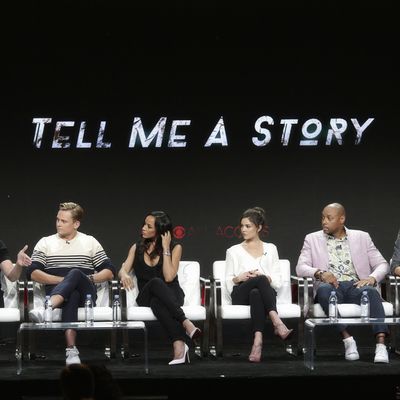
Strip back the supernatural whimsy and cartoon magic of the worldÔÇÖs most beloved fairy tales, and youÔÇÖll find dark themes that reveal the hidden truths of the human condition ÔÇö itÔÇÖs this insight thatÔÇÖs the driving force behind┬áCBS All Access┬ádrama┬áTell Me a Story, a psychological thriller that reimagines three classics (ÔÇ£The Three Little Pigs,ÔÇØ ÔÇ£Little Red Riding Hood,ÔÇØ and ÔÇ£Hansel and GretelÔÇØ) set in modern-day New York City.
Writer-producer Kevin Williamson talked to Vulture about creating a character study out of childhood fairy tales, and more. Read on for the details.
Why did you decide to take on this project?
After my last TV project, I was just exhausted. I didnÔÇÖt want to work in network television anymore. I was kind of uninspired. And so I took some time off, got back into features, and then this project came along and it reminded me who I was as a storyteller years ago ÔÇö and it was just fun.
I got charged by having a good time, and 10 episodes was doable. I wanted to step into the premium cable space and I thought this might be a new challenge; it was something different, but at the same time, it had all the ingredients of storytelling I had loved.
WeÔÇÖve been seeing a lot of folklore-inspired TV shows and films lately. What can we expect from this interpretation?
The original fairy tales were very, very dark. ÔÇ£Hansel and GretelÔÇØ is all about cannibalism, famine, and starvation. ÔÇ£Riding HoodÔÇØ is about sexual exploration, and the evil all around us, with the wolves lurking out in the world ÔÇö what happens when you stray from the path, essentially. They all sort of have that common theme. We just took a lot of those ideas and themes and brought those forward, but in a way thatÔÇÖs very now and very today. But at the same time, weÔÇÖre telling a classic tale of right and wrong. Good versus evil.
And unlike the other fairytale shows rooted in the supernatural, itÔÇÖs very grounded and reality-based. ItÔÇÖs definitely evolved. ItÔÇÖs a character thriller and itÔÇÖs about real people.
Can you talk about how you tackled introducing characters the audience is already familiar with?
We took todayÔÇÖs issues and problems, and whatÔÇÖs going on in the world, and used that to build characters. In our society, truth and lies are interwoven and perception is everything. Black, white, and gray. The show touches on all these things: The anger. The lack of hope. We play on all those ideas. Every character is struggling with something.
Why use New York as the backdrop?
We decided to do [Tell Me a Story] in New York City, because thereÔÇÖs such a┬átexture to New York, with so many different worlds and so many different bubbles that exist from one neighborhood to the next.
What kinds of deeper insights are you aiming to touch on in this storytelling?
I wanted to do a project that spoke to my feelings about the world today.
I sat in a room with the writers and asked, ÔÇ£WhatÔÇÖs going on that makes us angry and hopeful? How can we create a character that can take that journey of how weÔÇÖre all feeling that hopefully other people can relate to?ÔÇØ ThatÔÇÖs how we created the character of Jordan, James WolkÔÇÖs character. We sort of watch how he goes from a simple, sweet, and kind, generous man and turns into something very dark and dangerous. He takes a huge journey as he transforms into a wolf. And so we donÔÇÖt just start with a wolf. We watch the creation of a wolf and what caused it: the world around him.
ItÔÇÖs about loss, hope, revenge, and greed ÔÇö we took the really big ideas and incorporated them into the three stories.
This show will be airing via streaming service ÔÇö how did this affect your ideation versus with a traditional network-television format?
IÔÇÖm so relieved itÔÇÖs a 10-episode show on a streaming platform because we donÔÇÖt have to worry about advertisers, commercial breaks, and having to stretch our story out for 22 episodes. We have a beginning, middle, and end. ItÔÇÖs a complete viewing experience, and it lends itself to better storytelling. IÔÇÖm most excited to be in a space in which I can tell a story in the way I feel it should be told.
Tell Me A Story premieres Wednesday, October 31, exclusively on CBS All Access.
This is paid content produced for an advertiser by New York Stories. The editorial staff of Vulture did not play a role in its creation.

